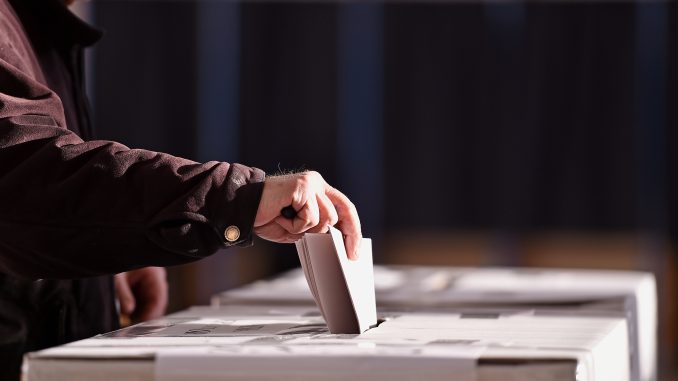
WASHINGTON, D.C. — Ten months before the United States votes in its first major election since the 2016 presidential contest, state election officials from across the country met in Washington over the weekend to swap strategies on dealing with an uninvited guest: Russia.
A pair of conferences usually devoted to staid topics about election administration were instead packed with sessions dedicated to fending off election cyberattacks from Russia or others, as federal authorities tried to portray confidence while pleading with some states to take the threat more seriously.
“Everyone in this room understands that what we are facing from foreign adversaries, particularly Russia, is real,” Chris Krebs, a senior cybersecurity official at the Department of Homeland Security (DHS), told an audience of secretaries of state, who in many states oversee elections. Russia, he added, is “using a range of tools against us.”
The department announced in December that 21 states had experienced initial probing of their systems from Russian hackers and that a small number of networks were compromised. The North Carolina State Elections Board’s executive director, Kim Westbrook Strach, sent a letter to DHS officially requesting information about any attempt to compromise election systems in North Carolina. DHS informed her that N.C. was not among those 21 states.
“We are greatly relieved to hear that North Carolina’s systems were not directly targeted by Russian hackers,” said Strach in December. “North Carolina will continue to be vigilant and work with federal partners in the ongoing effort to secure the democratic process in our state.”
Still, N.C. Attorney General Josh Stein sent a letter Monday to U.S. Department of Homeland Security Secretary Kirstjen Nielsen urging the agency to share more information with his office on county-owned voting machines.
“We appreciate these efforts by DHS,” Stein said in the letter. “However, I am also aware of many reports and concerns and understand that federal officials have at times been slow to share information and have not sufficiently coordinated their efforts with state and local officials.”
Voting machines in the 21 states that were targeted were not directly affected and there remains no evidence any vote was altered, federal elections officials say. While virtually all 50 states have taken steps since the 2016 election to purchase more secure equipment, expand the use of paper ballots, improve cybertraining or seek federal assistance, according to groups that track election security, some officials at the conferences expressed an added sense of urgency.
The meetings came immediately after U.S. Special Counsel Robert Mueller unsealed an indictment Friday accusing 13 Russians and three Russian companies of conducting a criminal conspiracy to interfere in the 2016 election.
The charges alleged a sophisticated multiyear operation carried out by a Russian propaganda factory to use false personas on social media to boost Donald Trump’s campaign. Russia has repeatedly denied it attempted to meddle.
DHS has taken the lead on working with states to improve voting machine security, but no federal agency is specifically responsible for combating online propaganda.
Several secretaries of state said they needed more rapid notification from federal partners about not just attempts to breach voting systems but disinformation campaigns as well.
“I don’t want to find out about propaganda two years later, after I elect my congressman,” said Mississippi Secretary of State Delbert Hosemann, a Republican, in an interview while clutching his own printed copy of the 37-page indictment.
Frustration boiled over at times among the secretaries of state, some of whom criticized a classified briefings U.S. intelligence agencies held with them over the weekend as largely unhelpful.
Federal officials, they said, continued to provide inadequate information to states about the nature of the Russian cyberthreat and how to protect against it.
“I would have thought that behind closed doors, I would have heard, ‘This is why this has to be classified.’ And I heard none of it,” said West Virginia Secretary of State Mac Warner, a Republican. Still, other secretaries of state and election directors said relationships with DHS had improved dramatically compared with a year ago.
Speaking on a panel and attempting to quell frustration, Robert Kolasky, another DHS cybersecurity official, stressed that U.S. intelligence officials were genuinely worried about how Russia or others may attempt to interfere in 2018.
“There are reasons we are worried that things could become more serious,” Kolasky said. “The Russians got close enough, and we anticipate it could be different, or worse, the next time around,” he said.



